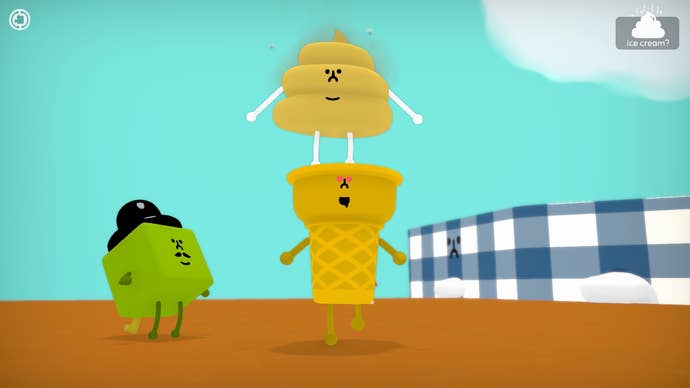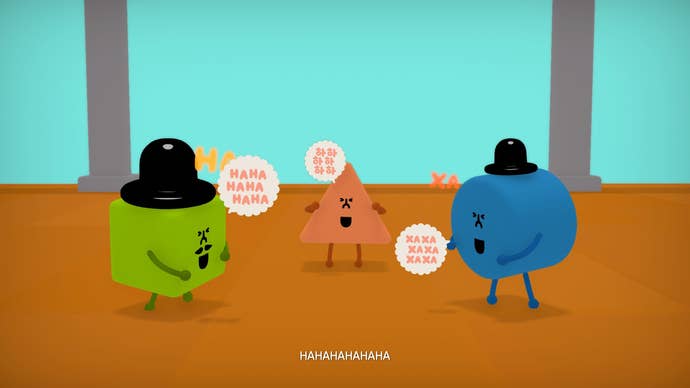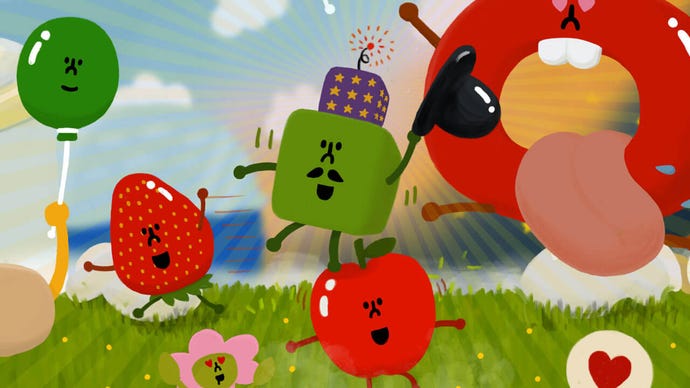Wattam Review: Cool Hat Trick
Wattam is a delightful game about friendship, the world, and poop, from the mind behind Katamari.
This article first appeared on USgamer, a partner publication of VG247. Some content, such as this article, has been migrated to VG247 for posterity after USgamer's closure - but it has not been edited or further vetted by the VG247 team.
"Are you okay?"
This is the common refrain from Wattam, the newest game from Funomena and Katamari Damacy director Keita Takahashi. If I had to answer it, I'd probably say, "nah." Sometimes, the inanimate objects that populate Wattam aren't okay either, and Wattam teaches us that that's okay too.
The world of Wattam houses familiar household objects, only here they have voices: children's laughter, at that. There are forks, bowling pins, trees, chestnuts, actual poop, and tables. And then there's our hero the Mayor, a lonely green cube with a mustache and a boiler hat. Underneath his hat he wields a surprise: a box that goes ka-boom! It's basically a bomb, but instead of causing violence, it makes everyone giggle and zip around the sky for a moment or so.
As the Mayor, you work to unite all the objects who got scattered due to a catastrophic incident. There's an issue though: everyone's separated by four continents that represent not only seasons, but different cultures too. On one block of land, for instance, the objects all speak Korean, while on another they speak English. (The languages are showcased via small speech bubbles.)

So what do you actually do in Wattam? You start out as the aforementioned Mayor. As the Mayor, your goal is to make friends and help folks out with their problems. You could be helping a doll put her face back together after her eyes, nose, and mouth fell off; or you could be making objects climb on top of one another to make a stack as tall as a bowling pin. Outside of the mission-by-mission structure of its short story, it's pure, goofy, sandbox fun. Once I made a tower of poops, just to see if I could be as tall as a tree. (I could.) You're not stuck with just playing the Mayor: you can play as anything and anyone, from a balloon to the sun in the sky. And the deeper you get into the story, the bigger the ecosystem of objects wandering around and living their lives gets.
The problems you have to solve often veer into ludicrous, but hilarious directions. In one, the sun "borrows" the receiver from an old fashioned telephone down below—the type your grandma probably still has—and never gave it back. The poor base of the telephone is sentient, like all things in this world, and sobbing because of the theft. The sun didn't really consider the phone base's feelings, did it? So it's up to you, the Mayor of this square rock, to return the receiver to its proper owner. The Mayor hitches a ride on a balloon, "Eye of the Tiger"-reminiscent music plays, and the sun apologizes—the brightest star just wanted to use the phone to reserve a lane at the bowling alley, after all.
This is Wattam in a nutshell. It is Keita Takahashi at his most Keita Takahashi. Silly beyond belief, charming beyond any reasonable measure. This is a game where poops and ice cream cones live in harmony with one another. And it's radiant. The theme song even—composed by Takahashi's wife Asuka Takahashi—sounds exactly like it'd fit in alongside the Katamari series' early soundtracks, which she also had a hand in composing. The Takahashi energy has never been stronger than it is in Wattam.
I did, unfortunately, encounter a number of significant hitches. The frame rate stutters and slows to a crawl if you're in an area with a lot of characters around. This is especially evident in Wattam's post-game where nearly everything is unlocked at once—all the islands, all the characters—so there's a lot going on on the screen at all times. I also sadly hit a progress halting save data bug. At around 91 friends made, approximately two-thirds of my way through Wattam's few hours long story, the game refused to load. After being greeted with the developer studio name flashing on the screen, it would get stuck on the supposed-to-be short loading menu. At first, I just assumed it was a long load time, but 10 minutes later, realized something was terribly wrong.
I deleted and reinstalled the game, thinking that might fix it, but to no avail. I tried deleting the newer of my save files, thinking that might be where the seemingly corrupted data was, and still had no success. I had to erase both my save files, sadly, to get Wattam to load up again properly. I then had to start the game over from scratch. It was about two hours of progress gone due to a bug, which is annoying.
It speaks highly of Wattam that this cumbersome setback didn't sour me on the game entirely. Review builds of games, before the usual Day One patch, typically have some bugs to anticipate; sometimes even save data corruption that forces you to start over. It's happened to me a couple times before.

I hope Wattam irons out its technical issues in a patch, and I'm curious if the PC version has similar issues. Regardless, if you can forgive the occasional sluggish frame rate and the looming potential of save data corruption, Wattam is a delight. It's a game that asks what we should be asking each other more: "Are you okay?"
And the world isn't okay—politically, economically, environmentally (as Barret would say, the world's dyin'), socially—but who knows, if we were more understanding of each other, it might be one day. It sounds a bit naive, and maybe it is too idyllic, but it's a noble message, nonetheless. Wattam is ostensibly a game that's teaching people how to be patient and understand others, regardless of barriers. Imagining kids playing this game, I hope it resonates. Or maybe they'll just giggle at all the ka-booms that sent dozens of their friends flying, like I sure did.
ConclusionSome significant technical issues manage to do little to hold back the charm and wit of Wattam. It's a game that's great fun for both kids and adults, with slapstick humor and a sweet message of understanding people, despite your differences, at its center. It's made with today's toxic climate in mind, boiling the world's issues into something that doesn't feel cloying, but instead feels positive and welcoming. That, to me, is an achievement.


